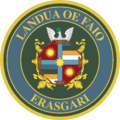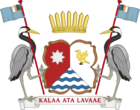President of the Government Council (Freice): Difference between revisions
No edit summary |
No edit summary |
||
| Line 2: | Line 2: | ||
{{Infobox official post | {{Infobox official post | ||
| post = President | | post = President | ||
| body = the Country of Freice<br>{{nobold|<small>Erasgari oe tela Landua oe Faio}} | | body = the<br>Country of Freice<br>{{nobold|<small>Erasgari oe tela Landua oe Faio}} | ||
| insignia = | | insignia = [[File:Seal of the President of Freice.png|120px]] | ||
| insigniacaption = | | insigniacaption = Presidential Seal of Freice | ||
| flag = [[File:Presidential Standard of Freice.png| | | flag = [[File:Presidential Standard of Freice.png|125px]] | ||
| flagcaption = Presidential Standard of Freice | | flagcaption = Presidential Standard of Freice | ||
| flagborder = yes | | flagborder = yes | ||
Revision as of 13:57, 6 June 2022
| President of the Country of Freice Erasgari oe tela Landua oe Faio | |
|---|---|
 Presidential Seal of Freice | |
 Presidential Standard of Freice | |
| Style | Honourable President[a] (domestic) Her Excellency (diplomatic) |
| Status | Head of Government |
| Member of |
|
| Residence | Kaimo Potio, Sekapa |
| Appointer | Direct popular vote |
| Term length | 2 years, renewable |
| Constituting instrument | Constitution of Freice |
| Precursor | Leader of the Government Council[b] |
| Formation | 11 April 2022 |
| First holder | Aniara Neileka |
| Deputy | Vice-President of Freice |
| Website | kuwanaara.fa/kaiagua |
 |
|---|
| This article is part of a series on the politics and government of Freice |
|
The president of the Country of Freice (Freician: Erasgari oe tela Landua oe Faio) is the regional head of state and head of government of Freice.
Freice, a Country of Riamo pursues a system comparable to presidentialism, whereby the president is head of the executive branch and independent from the legislative branch. As head of government, they are the highest executive official, with extensive political responsibilities including chairing the Government Council, signing bills into law, administering Freice's external affairs policy, and representing Freice internationally.[1] The president is an ex officio member of the Kivunna (the legislature), deviating from pure presidentialism, although they do not have a vote and cannot be removed by a vote of no confidence.[1]
The office was established with the passage of the Constitution of Freice in April 2022, which separated the positions of head of government and presiding officer of the legislature.[2] The creation of the post marks Freice's transition from a parliamentary to a presidential system of government. The president is directly-elected every two years. The first and incumbent president is Aniara Neileka, who has served in an acting capacity since 11 April 2022.[3] Neileka previously served as President of the Island Meeting from 20 January 2022.[4]
History
Pre-2022
On the passage of the first Freician constitution in 1972, the head of government was the president of the Assembly of Delegates, which combined the duties of government leader and legislative speaker.[5] The office was held alongside the position of Chair of the Senior Council, which served as the cabinet and executive body. With the granting of certain foreign policy powers to the Freician government in 1980, the president also discharged the duties of foreign minister de facto.
Under this system, the Freician government largely operated on a consensus basis. The president usually acted on the principle of unanimity in the Senior Council and in the wider Assembly, relying on a consent base of support to maintain their position within the assembly. This produced, based on the individual president, governments of varying stability.
Successive laws gradually increased the powers of the presidency. Initially, the president was largely restricted in their actions by what the Assembly approved. The Executive Powers (Leader of the Senior Council) Act 1978 gave the president the power to issue decrees in matters provided for by law, which were enforceable like acts of the Assembly.[6] The Government of Freice (Legislative Powers) Act 1981 reduced the powers of the Assembly in relation to the Senior Council, giving it (and therefore the president) the right to conduct relations with foreign governments in its own right, rather than as a committee of the Assembly.[7]
In the early 2000s, the presidency was given further powers akin to that of a traditional head of government. They were given greater powers in determining government policy and revoked the principle of first-amongst-equals that had governed the position since 1972.[8]
Post-2022
With the passage of the new constitution, the presidency was detached from the legislature. No longer was the president both presiding officer and head of government, and no longer was the president elected as a delegate to the legislature. With this evolution, the office was no longer an intermediary between different factions within the legislature, as was largely the case before, but now enjoyed a more active role within government.[3] For the first time, it was described in law as the "head of the government of the state" rather than its previous role as the "presiding officer of the body of executive power" - a more ambiguous description.[9]
The first holder of the office, Aniara Neileka, assumed the position in an acting capacity on its founding. In accordance with the constitution, the office is elected by the people, with its incumbents "serving a mandate granted by the people through their democratic participation."[10] As such, the only permanent officeholders permitted by the constitution are those elected.[4]
Election
Qualifications
A candidate for president is required to meet the following requirements to be eligible:[11]
- Be at least eighteen years of age
- Be a registered voter
- Possess Riamese citizenship and Freician nationality
- Be a permanent resident of Freice for at least five years at the time of election
Vote
The president of Freice is directly elected by the Freician electorate every two years in January. The candidate with a majority of the votes is elected; a second round is held if no candidate receives a majority.[12] In the event of a tie, the constitution mandates that the Kivunna elects the president from amongst the two candidates.[13] There are no term limits.
Oath or affirmation
Upon their election, presidents are required to take the following oath or affirmation:
I [name], having been elected by the people to the office of President, do solemnly swear/well and truly affirm and declare that I shall discharge the duties of the office of President in accordance with the Constitution of the Country of Freice, that I shall render true faith and allegiance to the Constitution of Freice, that I shall execute my powers and duties with full respect to the political, social, economic, and cultural rights of the Freician people, without fear or favour, affection or ill-will. (So help me God).[14]
Powers and Responsibilities
Executive powers
The president, according to the Constitution of Freice, is responsible for "supervising, directing, and implementing the actions and resolutions of the Government Council."[13] The president is Freice's chief executive and leads the executive branch. In this capacity, they appoint ministers to the Government Council, with the advice and consent of the Kivunna, and may request their removal.[15]
The president is responsible for overseeing the organisation of the island's government. As such, they may issue directives establishing new positions in the Government Council. However, they may not dissolve any position without the consent of the Kivunna. Under the constitution, the president is also empowered to propose constitutional amendments (along with the Kivunna).[10] Ministers in the government are accountable to the president, as well as the Kivunna, and work to implement the president's policies.
The president is also Honourary Commissioner of the Freice Police Service, a position akin to the commander-in-chief of the armed forces. In this position, they appoint the Inspector-General (the professional head of the service) with the approval of the Kivunna.
Legislative powers
As Freice's head of state, the president is responsible for granting assent to all bills passed by the Kivunna. Whilst they do not have the power of veto, they may refer any bills to the High Court when their constitutionality is in question.[15]
The president is responsible for calling the Kivunna into session, which they must do within one month of its election.[16] They also have the limited power to prorogue and dissolve the Kivunna, which they may only do under certain circumstances: when it has reached the end of its term, or when it has elected to dissolve itself.[13] As convenor of the Kivunna, the president may also elect to adjourn the Kivunna and reconvene it elsewhere, which is done only with a two-thirds majority vote by its members.[13]
The president makes formal reports to the Kivunna on the operations of government, and makes an annual address to the legislature announcing the government's program for the next year. This is done on the invitation of the President of the Kivunna.[15]
Judicial powers
The president's role within the judiciary is largely limited to appointing its members. Judges of the Court of Appeal and the High Court are appointed by the president on the advice of the Judiciary Appointments Council and with the consent of the Kivunna. The council recommends individuals, with the president at liberty to choose any person from this list.[15]
Whilst the president does not possess the power to issue commutations, pardons, or paroles in their own right, they have the ultimate right to accept or reject any recommendations made by the minister of justice.[13] The president is empowered to do so when the Kivunna approves any proposal for clemency.
Succession
The Constitution of Freice outlines the process of succeeding to the presidency in the event that the president leaves office prior to the conclusion of their term or is otherwise unable to exercise their duties. Succession to the office is on a temporary basis under the constitution, with each successor serving as acting president only.
The President of the Kivunna is the first-in-line in the line of succession; if they are unable to execute the office in the interim, the Vice-President of the Kivunna may issue an emergency order appointing an acting president.[13] In this scenario, the Kivunna may terminate the acting president's tenure and appoint a replacement.[17]
Unlike in most states, ministers do not automatically succeed to the presidency. This is, in part, because they were appointed by and answerable to the president, rather than serve as independent actors.[17]
List of presidents
| President | Took office | Left office | Party | Notes | |||
|---|---|---|---|---|---|---|---|
| 1 | 
|
Aniara Neileka February 3, 1982 |
April 11, 2022 | Incumbent | MURO Alliance | [c] | |
See also
References
- ↑ 1.0 1.1 "Government Council > President". Government of Freice. Retrieved 14 April 2022.
- ↑ "Meeting approves constitution draft". Radio and Television Freice. Retrieved 2 April 2022.
- ↑ 3.0 3.1 "Meeting approves constitution draft". Radio and Television Freice. Retrieved 3 April 2022.
- ↑ 4.0 4.1 "Neileka elected President". Radio and Television Freice. Retrieved 20 January 2022.
- ↑ "Constitution Act 1972" (PDF). Government of Freice. Retrieved 7 June 2018.
- ↑ "Executive Powers (Leader of the Senior Council) Act 1978" (PDF). Government of Freice. Retrieved 19 December 2015.
- ↑ "Executive Powers (Leader of the Senior Council) Act 1978" (PDF). Government of Freice. Retrieved 16 December 2015.
- ↑ "President seeks additional powers". Tama Adune oe Faio. Retrieved 12 January 2017.
- ↑ "Freice ends political conflict". Santa Elisa Live. Retrieved 4 April 2022.
- ↑ 10.0 10.1 "Constitution of the Country of Freice" (PDF). Government of Freice. Retrieved 15 April 2022.
- ↑ "Qualifications and requirements for election to the presidency" (PDF). Government of Freice. Retrieved 13 April 2022.
- ↑ "Aniara takes helm as interim president". Radio and Television Freice. Retrieved 11 April 2022.
- ↑ 13.0 13.1 13.2 13.3 13.4 13.5 "Constitution of Freice (2022)" (PDF). Government of Freice. Retrieved 21 April 2022.
- ↑ "Elections and Oaths Amendment Act 2022" (PDF). Government of Freice. Retrieved 25 April 2022.
- ↑ 15.0 15.1 15.2 15.3 "Freice: What does the president do?". Riamese Broadcasting Corporation. Retrieved 19 April 2022.
- ↑ "Freice constitution: separation of powers comes to Freice". Riamo News. Retrieved 4 April 2022.
- ↑ 17.0 17.1 "Presidential Succession (Regulations) Order 2022" (PDF). Government of Freice. Retrieved 22 April 2022.
Notes
External links

